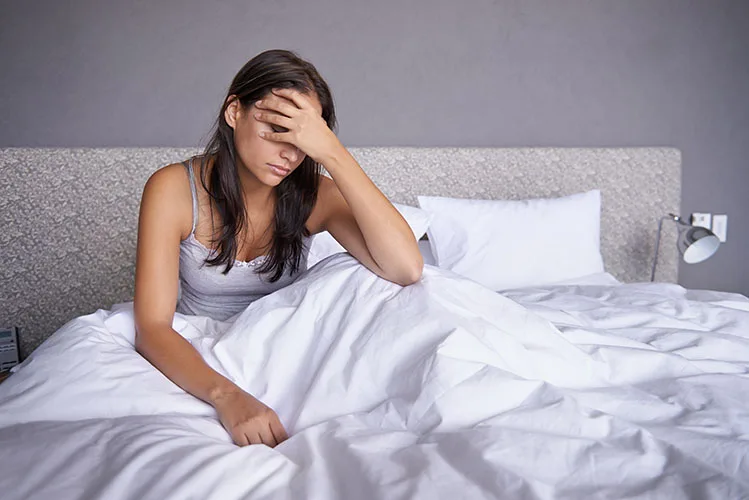There’s a strange rhythm to modern life.
Wake up, rush to work (or now, with remote jobs, shuffle to the laptop), juggle emails, maybe squeeze in a grocery run, call your mother back, then doomscroll at midnight even though you promised you wouldn’t.
Somewhere in this chaos, sleep gets downgraded, treated like a leftover side dish nobody ordered but ends up on your plate anyway.
I’ll be blunt: bad nights happen.
Sometimes it’s stress.
Sometimes it’s that stupid buzzing in your brain reminding you of something you forgot in 2012.
Sometimes, honestly, it’s just the wrong kind of dinner (have you ever tried sleeping after eating a giant bowl of spicy ramen? Don’t).
But what can you do to avoid the sleepless misery, or crawl back after you’ve had one?
Let’s break this apart.
Why We Keep Losing Sleep
Insomnia isn’t a one-size-fits-all monster.
For some, it’s poor habits: staying up “just one more episode” until you realize it’s 2 a.m.
For others, it’s anxiety gnawing at the edges, the heart racing like a hamster on an energy drink.
Sometimes, paradoxically, it’s pure excitement: anticipating a job interview, a trip, or even Amazon delivery (embarrassing but real).
There’s also tech. Blue light radiating from your phone is like caffeine for your brain. Scientists have screamed this for years, and still, here we are, scrolling TikTok in the dark. I’m guilty too.
Tips for Better Sleep: How to Prepare for Rest
Okay, here’s the part where you’ve probably heard advice before. But humor me. Let’s rethink it.
- Move your body (but not too late). If you do a tough workout at 10 p.m., your body will be revved up like a car engine. Evening activity is good, though, something around 6 or 7 p.m. It wears you down gently. Walks count. Even a half-hour of yoga where you stretch like a lazy cat does wonders.
- Errands at night? Could work. Some folks swear by running errands in the late evening: grocery shopping, folding laundry, so they crash after. Me? I once reorganized my closet at 11 p.m. and ended up wired, so test this with caution.
- Reading is underrated. And I don’t mean your phone or Kindle glowing like a mini sun. Grab a paperback, even if it’s something boring like a manual. I fell asleep once reading a history book about canals. Slept like a log.
- Ditch the phone in bed. I know, I know. But really, put it across the room. Or trick yourself: set it in airplane mode and tell yourself the world will survive without you for 8 hours.
- Play with light. Bright lights scream “stay awake”. Dim lamps or even fairy lights? Cozy, sleepy vibes. There’s a reason hotels invest in warm lighting.
- Bedtime consistency. Yes, it’s boring. But your body loves rhythm. Even if Friday night is calling, try not to throw your clock into chaos.
How to Recover From a Bad Night’s Sleep: Morning Reset Strategies
Alright, so you failed.
Maybe you stared at the ceiling until 3 a.m. and counted imaginary sheep that kept morphing into goats (I hate when that happens).
What then?
- Get up anyway. Snoozing the alarm makes it worse. Brutal, but true.
- Let sunlight smack you in the face. Open the blinds, or just step outside for 15 minutes. Morning light tells your body, “Hey, this is daytime, reset yourself”.
- Cold shower. I used to roll my eyes at this, but after one particularly horrible night during last year’s heatwave, I tried it. Shocked my system awake. Honestly, better than coffee. (But still have the coffee.)
- Yes, coffee. Dark, bitter, grounding. Don’t overdo it though, you’ll crash by noon. Green tea works too if coffee makes your stomach riot.
- Plan your day realistically. Write down tasks. Put heavy work upfront while you’ve got momentum, and save the lighter stuff for when your brain inevitably starts melting around 2 p.m. This is one sure way to improve productivity after a bad night’s sleep.
- Nap. But short. Ten to twenty minutes. Enough to recharge, not enough to trick your brain into thinking it’s bedtime. I once slept an hour at noon and woke up feeling like I’d time-traveled to another century.
- Cosmetic fixes. Puffy eyes? Cold spoon in the freezer trick, concealer if that’s your thing, even cucumber slices (yes, that cliché spa move). It won’t cure tiredness, but it helps you not look like a zombie.
The Emotional Rollercoaster Nobody Talks About
Sleep deprivation messes with your mind in sneaky ways.
You’ll feel overly emotional: tears at a car commercial, anger at someone walking too slowly in front of you.
Your brain literally processes emotions differently after poor sleep.
Studies out of UC Berkeley showed amygdala hyperactivity skyrockets without enough rest.
Translation: you’re cranky, irrational, sometimes hilariously dramatic.
And then there’s guilt.
“Why didn’t I go to bed earlier? Why did I scroll Reddit until 1 a.m. reading conspiracy theories about pigeons?”
It’s a cycle.
Forgive yourself.
Move forward.
Modern Twists and Real-Life Hacks
- Screens aren’t always the enemy. Some people genuinely sleep better with calming YouTube videos: forest sounds, rainfall, even Bob Ross painting happy little trees. Weirdly comforting.
- Apps now track your sleep. Oura rings, Fitbits, Apple Watches. But beware: sleep tracking can become another stressor. If you wake up and see a “bad score”, you’ll stress more. Use them lightly, not obsessively.
- News cycles matter. These days, constant updates about elections, climate disasters, celebrity scandals, it all bleeds into bedtime. Maybe mute Facebook and X after 9 p.m.?
There was a night, during the pandemic, actually, when I couldn’t sleep at all.
I lay in bed until sunrise. Anxiety chewed me alive.
Finally, I got up, brewed coffee, and walked outside barefoot.
The dew was cold, the air sharp, and for a second, the world felt cleaner than my head.
That moment kept me upright the whole day, even though I was a walking shadow by evening.
The lesson?
Sometimes survival isn’t pretty, it’s just doing the next thing.
Sleep is both fragile and stubborn.
You can chase it, and it slips away; you can ignore it, and it smacks you down later, which is why building habits to improve sleep quality really matters.
The trick is in the rituals, the small cues you give your body and brain.
And when all else fails, when the night collapses into restless tossing, there’s still morning light, still coffee, still another chance.
Because honestly, everyone has bad nights.
The goal isn’t perfection.
The goal is resilience.
FAQs About Bad Nights and Better Sleep
How can I recover from a bad night’s sleep quickly?
The best way to recover from a bad night’s sleep is to wake up at your usual time, get some natural light, and move your body early. A short nap later in the day—no longer than 20 minutes—can help you recharge without disturbing your next night of rest.
What are the best tips for better sleep?
Better sleep starts with routine. Going to bed around the same time each night, dimming lights in the evening, avoiding your phone in bed, and adding light activity like stretching or a walk can all set the stage for quality rest.
How much sleep do adults need for good health?
Most adults function best on 7 to 9 hours of sleep each night. Staying within that range supports energy, mood, and long-term health while helping improve overall sleep quality.
What should I do the morning after poor sleep?
After a rough night, it helps to get sunlight, drink water, and keep your day realistic. Put demanding tasks in the morning while your energy is higher, then save lighter work for later when fatigue sets in.
Do sleep tracking apps improve sleep quality?
Sleep tracking apps and wearables can highlight patterns and habits, but they aren’t always exact. They work best as a gentle guide to encourage consistent routines rather than a precise measure of your sleep.
Tags: sleep tips, recover from a bad night sleep, improve sleep quality, morning after poor sleep, circadian rhythm reset, blue light and sleep, bedtime routine, sleep tracking apps, insomnia recovery, DL009






